 Talk of "Oscar bait" tends to swirl around those Supporting Roles that contain a few key ingredients. First, a "baity" role is usually pretty indispensable to the storyline while also secondary within it. Second, the "baity" role usually has a showstopping quality, as either foil or scenestealer to the central character. Third, such a "baity" role also has to have at least one bravura turn, the cinematic equivalent of an aria in which the whole film stops to watch the Supporting player seize center frame. (When an actual song is not an option, a mad scene is usually your best bet.) Both JHud and Angelina snagged trophies for just such Supporting "bait" performances, and it remains a surprise to some that a similar honor did not go to...
Talk of "Oscar bait" tends to swirl around those Supporting Roles that contain a few key ingredients. First, a "baity" role is usually pretty indispensable to the storyline while also secondary within it. Second, the "baity" role usually has a showstopping quality, as either foil or scenestealer to the central character. Third, such a "baity" role also has to have at least one bravura turn, the cinematic equivalent of an aria in which the whole film stops to watch the Supporting player seize center frame. (When an actual song is not an option, a mad scene is usually your best bet.) Both JHud and Angelina snagged trophies for just such Supporting "bait" performances, and it remains a surprise to some that a similar honor did not go to...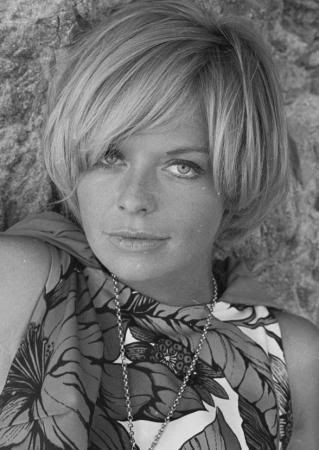
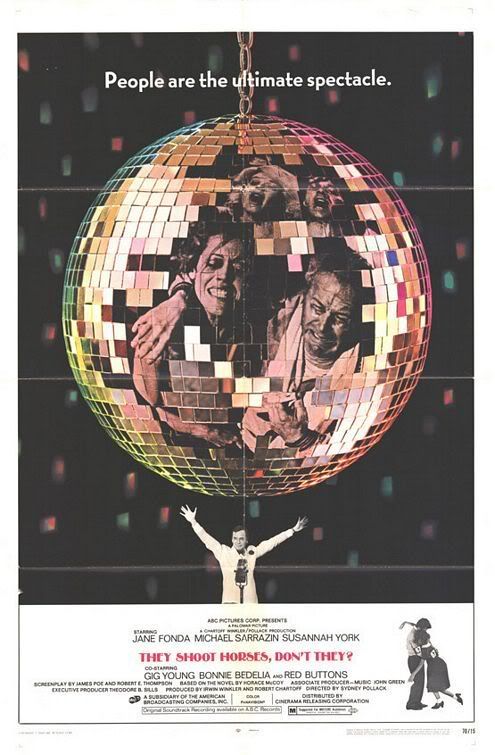
...Susannah York in They Shoot Horses, Don't They? (1969)
approximately 21 minutes and 25 seconds
32 scenes
roughly 18% of film's total running time
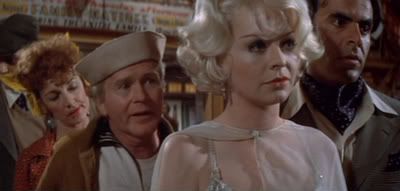 York's Alice presents herself as a serious actress -- even proffering a monologue from Saint Joan at the merest provocation -- but her platinum blonde tresses and silk satin sheath dresses (not to mention her swarthy Latin-ish lothario of a dance partner) are as suggestive of the young woman's desperation as they are of her actual star potential.
York's Alice presents herself as a serious actress -- even proffering a monologue from Saint Joan at the merest provocation -- but her platinum blonde tresses and silk satin sheath dresses (not to mention her swarthy Latin-ish lothario of a dance partner) are as suggestive of the young woman's desperation as they are of her actual star potential.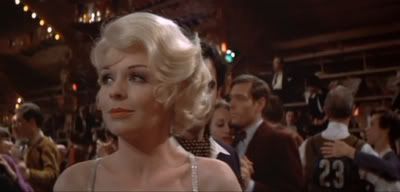 York's Alice immediately stands out among her competitors, a seemingly radiant star among the common folk.
York's Alice immediately stands out among her competitors, a seemingly radiant star among the common folk.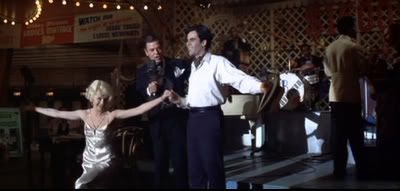 Alice's glamorous persona also marks her for a special variety of humiliation, and York scores her characterization of Alice deftly in what are to become the first stages in her ultimate devastation. First, when Alice's second dress is stolen along with her makeup from her suitcase, York's Alice explodes from the gate of her carefully disciplined persona.
Alice's glamorous persona also marks her for a special variety of humiliation, and York scores her characterization of Alice deftly in what are to become the first stages in her ultimate devastation. First, when Alice's second dress is stolen along with her makeup from her suitcase, York's Alice explodes from the gate of her carefully disciplined persona.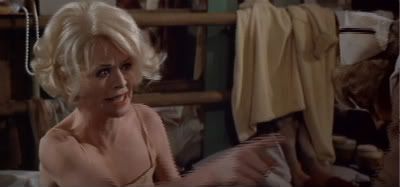 In this scene, York dramatically cues not only that Alice is a teensy bit nutso but also that she's an unusually taut wire, capable of snapping at the slightest moment. York's work in this scene -- establishing the precise ways in which Alice's facade might crumble -- serves the film in subtle but indispensable ways. In short, once we see that Alice is capable of disintegrating in this way, we know it might happen again and Alice's mere presence on the screen thereafter amplifies the dreadful tension upon which the film's grueling narrative depends.
In this scene, York dramatically cues not only that Alice is a teensy bit nutso but also that she's an unusually taut wire, capable of snapping at the slightest moment. York's work in this scene -- establishing the precise ways in which Alice's facade might crumble -- serves the film in subtle but indispensable ways. In short, once we see that Alice is capable of disintegrating in this way, we know it might happen again and Alice's mere presence on the screen thereafter amplifies the dreadful tension upon which the film's grueling narrative depends.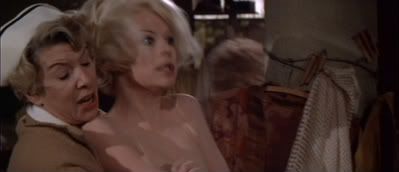 Yet, even as we become ever more attuned to Alice's capacity to lose it at any moment, York's Alice remains naive to what's in store for her as the marathon wears on.
Yet, even as we become ever more attuned to Alice's capacity to lose it at any moment, York's Alice remains naive to what's in store for her as the marathon wears on. 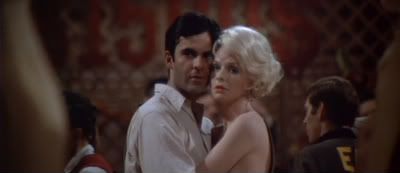 Throughout, the film utilizes York's Alice to underscore the cynical (and profitable) pleasures to be derived from the dance marathon as a spectacle of human suffering. Seeing York's Alice stripped of her heavenly glamor is but the first step in the character's long descent, Alice standing as the film's symbolic metaphor for the distance between the competitors's dreams and their realities. And nowhere is the spectacle of human suffering more vividly on display than in "The Derby," a ten-minute speed-walking race in which the couples race for the finish line to avoid elimination as one of the three last-place finishing couples.
Throughout, the film utilizes York's Alice to underscore the cynical (and profitable) pleasures to be derived from the dance marathon as a spectacle of human suffering. Seeing York's Alice stripped of her heavenly glamor is but the first step in the character's long descent, Alice standing as the film's symbolic metaphor for the distance between the competitors's dreams and their realities. And nowhere is the spectacle of human suffering more vividly on display than in "The Derby," a ten-minute speed-walking race in which the couples race for the finish line to avoid elimination as one of the three last-place finishing couples.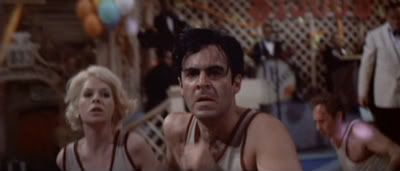 In "The Derby," Alice's vestigial glamor melts away and she's left wilted but standing, her fabricated Hollywood persona no longer maintaining the illusion that Alice's aspiration is distinctly different from the other competitors' desperation.
In "The Derby," Alice's vestigial glamor melts away and she's left wilted but standing, her fabricated Hollywood persona no longer maintaining the illusion that Alice's aspiration is distinctly different from the other competitors' desperation.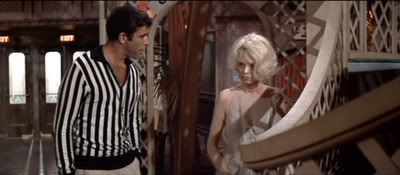 Director Sidney Pollock uses York's performance as Alice as a kind of narrative foil. York's work -- like that of Red Buttons's in the role of Sailor -- proves useful as a kind of counterpoint for the narrative's central character of Gloria (Jane Fonda, basically good if vocally limited). Both Fonda's Gloria and York's Alice are aspiring actresses, shut out of the Hollywood machine and nearing the end of their rope. Yet, where York's Alice aspires to be a movie star, Fonda's Gloria is only trying to get work as an "atmosphere" player, or an extra. Alice wants to live the Hollywood dream; Gloria wants to eat in a company town.
Director Sidney Pollock uses York's performance as Alice as a kind of narrative foil. York's work -- like that of Red Buttons's in the role of Sailor -- proves useful as a kind of counterpoint for the narrative's central character of Gloria (Jane Fonda, basically good if vocally limited). Both Fonda's Gloria and York's Alice are aspiring actresses, shut out of the Hollywood machine and nearing the end of their rope. Yet, where York's Alice aspires to be a movie star, Fonda's Gloria is only trying to get work as an "atmosphere" player, or an extra. Alice wants to live the Hollywood dream; Gloria wants to eat in a company town. 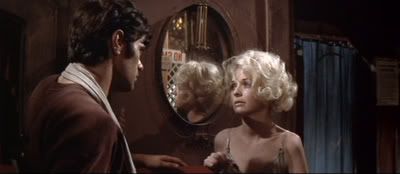 Yet for both women -- the leading lady and the extra -- the wide-eyed, masculine simplicity of the drifter Robert (Michael Sarrazin, a cipher-like actor portraying the cipher of a role) seems to hold redemptive promise.
Yet for both women -- the leading lady and the extra -- the wide-eyed, masculine simplicity of the drifter Robert (Michael Sarrazin, a cipher-like actor portraying the cipher of a role) seems to hold redemptive promise.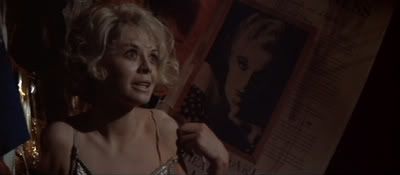 In what is one of the most curious turns of the narrative, York's Alice determines to seduce Robert, thus causing a rift between he and his prickly partner Gloria, impelling Gloria to dance first with Alice's mercenary partner and then with the "mature" Sailor (Red Buttons delivering a vivid performance) as the second, fateful "Derby" round begins.
In what is one of the most curious turns of the narrative, York's Alice determines to seduce Robert, thus causing a rift between he and his prickly partner Gloria, impelling Gloria to dance first with Alice's mercenary partner and then with the "mature" Sailor (Red Buttons delivering a vivid performance) as the second, fateful "Derby" round begins.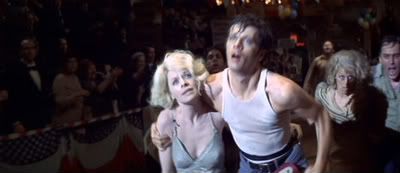 When, at Derby's end, Fonda's Gloria carries Sailor's corpse (he suffered an apparent heart attack during the race's final minute, something Gloria -- in her desperate quest not to lose -- seems not to have noticed), Fonda's Gloria lays Sailor's lifeless body upon Alice's lap, thus instantiating what proves to be the final episode in Alice's devastation.
When, at Derby's end, Fonda's Gloria carries Sailor's corpse (he suffered an apparent heart attack during the race's final minute, something Gloria -- in her desperate quest not to lose -- seems not to have noticed), Fonda's Gloria lays Sailor's lifeless body upon Alice's lap, thus instantiating what proves to be the final episode in Alice's devastation.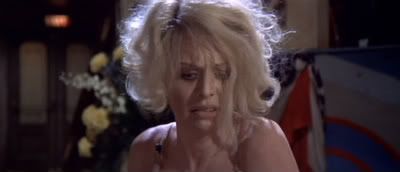 In the sequence that follows, York's Alice -- having realized that Sailor's dead body was lain across her single remaining dress -- experiences something akin to a psychotic break.
In the sequence that follows, York's Alice -- having realized that Sailor's dead body was lain across her single remaining dress -- experiences something akin to a psychotic break.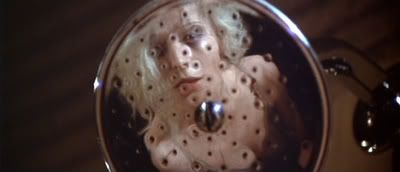 She begins to shower, while fully clothed, distractedly scrubbing a bar of soap across the surface of her gown.
She begins to shower, while fully clothed, distractedly scrubbing a bar of soap across the surface of her gown.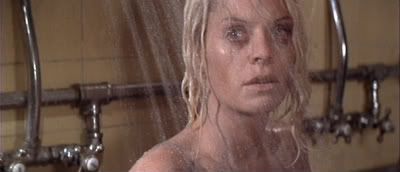 At this moment, York inaugurates Alice's final descent into complete madness, her frayed grip on sanity snapping possibly forever. Here, too, Alice's character arc is poised in stark, productive distinction with the similarly drastic demise of Fonda's Gloria. However, Pollack utilizes the distinction to demonstrate that -- even though both women were pressed to their limit by the stresses of the competition -- Fonda's Gloria retained her sanity even as those around her (first, Allyn Ann McLerie's Shirl and, then, Susannah York's Alice) lost hold of theirs.
At this moment, York inaugurates Alice's final descent into complete madness, her frayed grip on sanity snapping possibly forever. Here, too, Alice's character arc is poised in stark, productive distinction with the similarly drastic demise of Fonda's Gloria. However, Pollack utilizes the distinction to demonstrate that -- even though both women were pressed to their limit by the stresses of the competition -- Fonda's Gloria retained her sanity even as those around her (first, Allyn Ann McLerie's Shirl and, then, Susannah York's Alice) lost hold of theirs.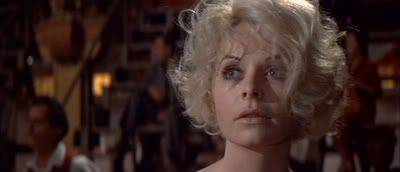 York does two really amazing things with the role of Alice. First, York maintains Alice's ominous fragility with an intriguing intensity: from early on, we're sure she's gonna snap at some point and we're always checking to see if now's gonna be the moment. Second, York allows Alice to be an actual person even though the film's showiest character is scripted almost entirely as a counterpoint/foil for Fonda's character arc. I love that York gives Alice a fleeting stammer, a verbal tic that manifests only when Alice is caught "out" of her contrived character/persona. Moreover, in what is to my mind the actress's most formidable accomplishment in the role, York's Alice is both haunting and heartbreaking but never especially likable. It would have been much easier to make Alice a sweet victim but, in ways I can't put my finger on, York doesn't do that, opting instead to craft Alice as a fascinating, flawed mess caught in the same web of selfish desperation as everyone else. Hers is a strange, surprising, essential performance within a brutally cynical film.
York does two really amazing things with the role of Alice. First, York maintains Alice's ominous fragility with an intriguing intensity: from early on, we're sure she's gonna snap at some point and we're always checking to see if now's gonna be the moment. Second, York allows Alice to be an actual person even though the film's showiest character is scripted almost entirely as a counterpoint/foil for Fonda's character arc. I love that York gives Alice a fleeting stammer, a verbal tic that manifests only when Alice is caught "out" of her contrived character/persona. Moreover, in what is to my mind the actress's most formidable accomplishment in the role, York's Alice is both haunting and heartbreaking but never especially likable. It would have been much easier to make Alice a sweet victim but, in ways I can't put my finger on, York doesn't do that, opting instead to craft Alice as a fascinating, flawed mess caught in the same web of selfish desperation as everyone else. Hers is a strange, surprising, essential performance within a brutally cynical film.

11 comments:
I am really glad you agreed with me on this. I have always loved this performance in a movie I have seen more than 20 times. I know, I need to get out more, but Miss York's Alice is one of the more tragic characters I have seen in a motion picture. Her complete breakdown in the shower should be a litmus test to other performers. It is so scary because it is so real and it is a tribute to Miss York's grasp on the character that she , at first seems so confident , due to her beauty and as that starts to fade as well as her wardrobe, that she has nothing else to hang on to. She is exposed and she has nowhere to let that out but a feral rage , not because of poor Red Buttons, but I feel that she finally knows that she is as lost as the people around her.
I was generally underwhelmed by this perf. She's good - basically - but the disparate parts of her characterization don't really cohere.
I remember being awestruck when seeing this performance for the first time and afterwards racing to the interweb to see who could have possibly beaten her for the Oscar (imagine my surprise...)
She's greatest part of a great great film (but apparently she doesn't think much of herself in it)
tag
par -- interesting.
I loved her performance myself but the whole film is such a "wow" that it's hard to pick a "best in show"
FAR AND AWAY...W/OUT A DOUBT...THE BEST PERFORMANCE BY AN ACTRESS IN A SUPPORTING ROLE FOR 1969...ALSO A BAFTA WINNER...SHE WAS AMAZING IN THIS...YORK IS TRULY FLAWLESS IN HER INTERPRETATION...
We've probably all read Inside Oscar, but if you haven't, the scuttlebut is that York tried to get herself un-nominated because she disliked her performance and because she resented being drawn into a competition for which she had not signed up. Since Susannah York was hardly George C. Scott, no surprise that her vocal opposition to the contest (if nothing else) cost her the trophy.
I'm gonna see it yet again tomorrow, for the smackdown.
But was she that close to winning? I'm not so sure. Goldie's win is kinda hilarious, but Dyan Cannon had the NYFCA, the looks and a consistent performance (and the film's best) in a leading role. And Catherine Burns... oh well... she had the performance in case they really wanted to play fair.
I think York's ridiculous whining really took her out of contention for the win, but I don't know if she was that close to winning in the first place. Goldie Hawn was definitely the safe choice - the other candidates would be edgy picks even now. Sylvia Miles would never have come anywhere close to the statue. I don't know how big Cannon's chances were, but I do think Burns gave the best performance out of the five - it was probably the least seen, even then, out of the five contenders, and the film's subject matter would have turned off older voters (who were far more staunchly conservative then than they are now).
A very fine read-out. BTW had screenwriter James Poe directed the film as he'd hoped to do (before the project "got away from him" as so many Hollywood films do) the part would have been played by his then-wife -- Barbara Steele.
"They Shoot Horses....." - I like her performance and the whole film is such a good.
Post a Comment